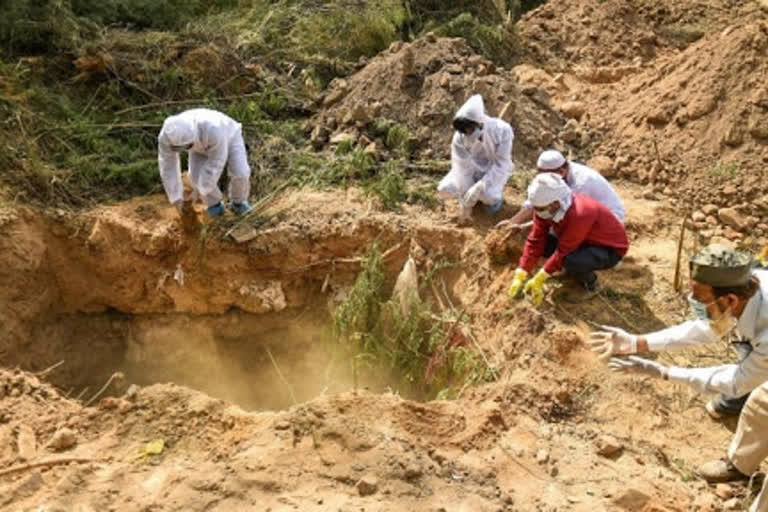Hyderabad: Incidents of people hindering burials or cremations of COVID-19 victims are being reported from across the country.
The major reason for this is the lack of public awareness and misconceptions over burial and cremation of COVID-19 victims.
Myth: Dead body of COVID-19 patient can transmit the novel coronavirus
The interim guidelines issued by the WHO in late March (the Government of India too issued the directive on March 15) this year, on Infection Prevention and Control for the safe management in the context of COVID-19 is quite simple and clear.
Dead bodies do not transmit disease. A dead person cannot sneeze or cough or breathe. So, the common ways of spreading the infection end the moment a person dies. Viral replication also stops. The skin may contain viral particles, and therefore, the body has to be neatly wrapped in a cloth, and no need for a body bag. Only the healthcare workers preparing the dead body and the mortuary staff need to wear PPE. So long as there is no touch, there is a zero percent chance of spread of infection.
Hence, both burning or burying a dead body is safe. The virus cannot climb up from the 8 feet deep pit. Neither can it survive the 4,000 degrees centigrade fire in the crematorium. In addition to that, fumes don't carry the virus. These simple messages, if communicated properly to the public, could have averted indignities to doctors and people who were refused a proper burial or cremation.
Chronology of incidents involving people stopping cremation or burials of COVID-19 victims
23.04.2020
The health authorities in Dakshina Kannada district drove more than 40 kilometres from one village to another in search of a burial ground, after residents refused to allow the cremation of the COVID-19 patient.
The local MLAs chose to stand with the people instead of persuading them that the burial or cremation, as per the COVID-19 guidelines, was safe. A 75-year-old woman (P432) from Kasba in Bantwal taluk died of COVID-19 in Wenlock Hospital in Mangaluru, four days after her daughter-in-law (P390) died due to the same disease.
The district administration arranged for the cremation of P432, the locals in Pacchanadi in Mangaluru protested and drove out the officials. The ordeal continued late through the night as the body was shunted from one crematorium to the other as villagers in Moodushedde and Nandigudde too put up resistance. Finally, the body was taken back to Bantwal and cremated at the Kaikunje burial ground amid protests from the locals there too.
19.04.2020
Dr Simon Hercules, a prominent neurosurgeon from Chennai, had died after a two-week battle with Covid-19. Civic officials granted permission for his body to buried at a cemetery in Kilpauk area. But outside the graveyard, an angry crowd afraid of being infected by the virus forced the ambulance to turn away.
The ambulance then turned towards a burial ground in Anna Nagar, were protesting locals not only blocked its path but also attacked with sticks and stones. They broke the vehicle’s windows and injured the driver, a sanitation worker, and a civic official, forcing everyone in the ambulance to abandon the body for a while and seek safety.
Late into the night, three of Hercules’ colleagues, dressed in complete protective gear, returned to the cemetery with a police escort and buried the doctor themselves.
15.04.2020:
Meghalaya’s first COVID-19 patient — a 69-year-old physician and founder of one of the first big private hospitals of the state — was buried at a church cemetery, almost 36 hours after he died.
The family wanted to bury him in Nongpoh, where they own a house. But residents and community leaders refused, citing the virus. Then, when discussions started to cremate the body, those living near the crematorium in Shillong’s Jhalupara protested. Then the government reached out to churches.
13.04.2020
The doctor, a native of Nellore in Andhra Pradesh, was brought to Chennai for treatment after he tested positive for COVID-19. He contracted the virus while treating some patients, the sources said. His cremation was stopped after residents near the Ambattur crematorium in Chennai raised objections. The officials were forced to take away the body due to protests by the locals. None of the family members of the deceased were present since they are also under quarantine. Health officials said the body would be cremated on the outskirts of the city.
08.04.2020
Punjab reported another disturbing case when a man from Kapurthala refused to accept his mother’s body or perform her last rites after she died of COVID-19, despite block officials offering to provide him with proper protective gear for his safety. Finally, the officials themselves cremated the woman.
06.04.2020
Family members of a 69-year-old woman who died of COVID-19 in a private hospital, refused to accept her body and cremate it, forcing the district administration to perform her last rites. The incident happened in the Shimlapuri village Ludhiana District.
02.04.2020
In Punjab, when noted Gurbani singer and Padma Shri winner Nirmal Singh Khalsa died of coronavirus, his cremation was stalled for several hours by residents of his native town. Afraid that his body might spread the virus, the residents gathered around the crematorium and locked the gates.
“Smoke raised during the cremation can infect villagers,” said a local leader. After hours of negotiation with them, the local administration finally cremated Khalsa at a secluded spot away from the cremation ground.
01.04.2020
The trustees of a Muslim cemetery in Mumbai’s Malvani area refused to allow the burial of a 65-year-old resident, because “he was coronavirus positive”. When the trustees refused to budge despite intervention from the local police and politicians, the man was finally cremated at a Hindu crematorium nearby.
29.03.2020
A coronavirus victim in Ahmedabad Gujarat was denied burial at a cemetery after a protest by locals amid fear of the spread of the viral infection.
ALSO READ: PIL on repatriation of bodies of Indians who died of non-corona reasons abroad



